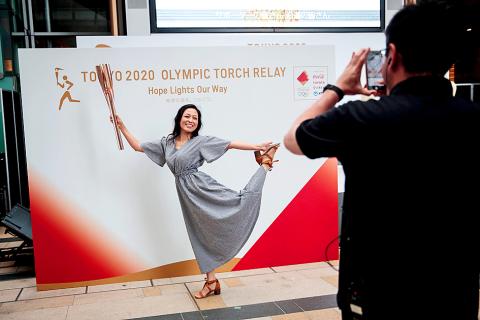Tokyo 2020 organizers yesterday unveiled the uniforms to be worn by 10,000 volunteer runners during the torch relay and presented further details about the route the relay would take.
The torch is to travel through all 47 of Japan’s prefectures — from Hokkaido in the north to southern Okinawa — and most of the country would have the chance to see the torch, with 98 percent of the population residing within an hour’s distance from the route, organizers said.
The 121-day relay is to begin on March 16 next year at the J-Village in Fukushima, which is Japanese soccer’s national training center and a symbol of resilience during the 2011 earthquake and tsunami that killed almost 16,000 people.

Photo: AFP
Games organizers have sought to stress the importance of the Tokyo Olympics as the “reconstruction Olympics” and it was evident in the choice of the route, which is to pass through Okuma, where part of the Fukushima Dai-ichi nuclear power plant complex is located, and past Kumamoto Castle, which sustained heavy earthquake damage in 2016.
“It is not just about places where people can come or around landmarks, but the torch will also visit areas affected by the great Japan earthquake and Kumamoto Castle, recovering from the Kumamoto earthquake,” said Miho Takeda, a Tokyo 2020 committee member and five-time Olympic medalist in synchronized swimming.
“The relay will go through areas of Japan that are working hard to recover from natural disasters,” she said.
The torch is also to visit the Hiroshima Peace Memorial Park and pass Mount Fuji before arriving at the National Stadium in Tokyo on July 24 for the opening ceremony.
The runners’ uniform, designed by fashion designer Daisuke Obana, was unveiled by three-time Olympic gold medal-winning judoka Tadahiro Nomura.
The uniforms, which are produced in part from recycled plastic bottles, incorporate a diagonally-draped red sash similar to those used as batons in Ekiden, Japan’s famous long-distance relay events.
“The torchbearer uniform is eco-friendly. Coca Cola collected plastic bottles in their company and recycled them to use them in the uniform material,” Nomura said.

Two people died on Thursday after fans and police clashed outside the Estadio Monumental in Santiago ahead of a game in South America’s Copa Libertadores, Chilean authorities said. The fatalities happened shortly before the match between Chile’s Colo-Colo and Brazilian club Fortaleza, when police blocked about 100 fans when they attempted to enter the stadium. There were conflicting accounts of how the fatalities occurred, with local media reporting that one of the dead was a 13-year-old boy. The other victim was an 18-year-old woman, according to a relative at the hospital where she was treated. The fans died after being caught underneath a

College basketballer Kaitlyn Chen has become the first female player of Taiwanese descent to be drafted by a WNBA team, after the Golden State Valkyries selected her in the third and final round of the league’s draft on Monday. Chen, a point guard who played her first three seasons in college for Princeton University, transferred to the University of Connecticut (UConn) for her final season, which culminated in a national championship earlier this month. While at Princeton, Chen was named the Ivy League tournament’s most outstanding player three times from 2022 to last year. Prior to the draft, ESPN described Chen as

College basketballer Kaitlyn Chen (陳凱玲) has become the first player of Taiwanese descent to be drafted by a WNBA team, after being selected by the Golden State Valkyries in the third and final round of the league's draft yesterday. Chen, a point guard who played her first three seasons in college for Princeton University, transferred to the University of Connecticut (UConn) for her final season, which culminated in a national championship on April 6. While at Princeton, Chen was named the Ivy League tournament's most outstanding player three times from 2022 to last year. Prior to the draft, ESPN described Chen as a

Japan yesterday secured a second consecutive Billie Jean King Cup finals appearance with a 2-1 win over 2023 champions Canada, thanks to Ena Shibahara and Shuko Aoyama’s 6-3, 5-7, 6-2 win over Kayla Cross and Rebecca Marino in the qualifying doubles decider. Shibahara and Aoyama powered through the opening set 6-3, breaking twice for a quick 3-0 lead. Cross and Marino hit back in the second, edging it 7-5 to level the match, before the Japanese pair regained control in the third. Canada’s 18-year-old Victoria Mboko edged Shibahara 6-4, 6-7 (8/10), 7-5 in a marathon opening clash. Mboko fired eight aces to